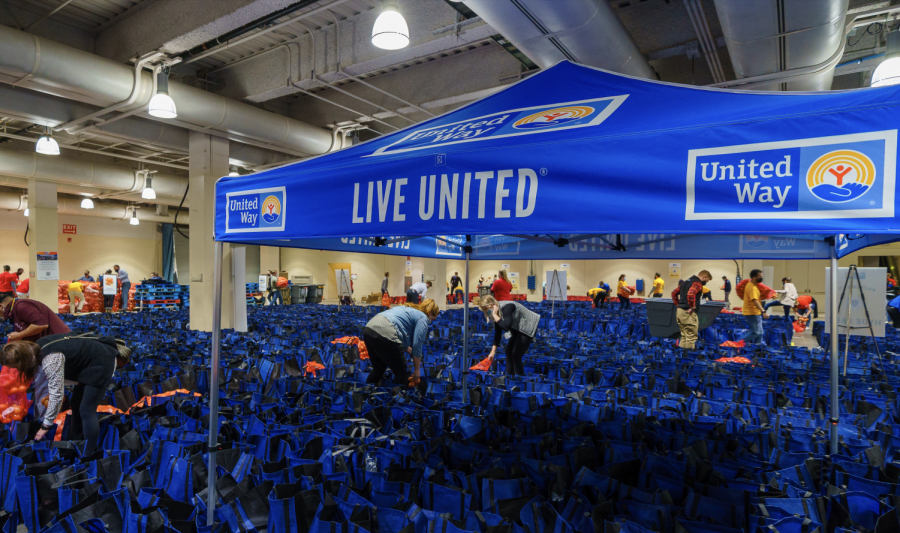Nonprofits fight food insecurity in Latin, Black, queer communities this holiday season
Volunteers fill bags with resources at the 22nd annual Thanksgiving Project at United Way of Massachusetts Bay and Merrimack Valley in 2021. Photo courtesy of United Way.
November 22, 2022
As inflation reaches a 40-year high, expenses for basic survival needs — like food — grow increasingly out of reach for many. Currently, almost one in three adults, or 1.8 million, in Massachusetts struggle with food insecurity.
In efforts to provide for homeless, hungry and marginalized communities this upcoming holiday season, nonprofits around Boston are gathering volunteers to package essential resources and serve the community.
“To me, food is such a basic need that people aren’t able to focus on other things in their life when they’re hungry,” said Ashley Kouyoumjian, the senior manager of development at the Greater Boston Food Bank, or GBFB. “Being able to support that is so important.”
Far and wide, households across the country wrestle with financial dilemmas: Do they use their savings to heat up their house, purchase medication or eat? For some, these dilemmas are rooted in society and the distribution of wealth.
“There are systemic barriers to financial prosperity and wellbeing and success that are prevalent in our society and our communities,” said Xavier Andrews, the senior director of communications at United Way of Massachusetts Bay and Merrimack Valley. “Unfortunately, our Black and Latinx community members often bear the brunt of those challenges.”
As grocery expenses skyrocket, inflation allows for privileged communities to be able to access resources that are less obtainable for traditionally marginalized groups. According to a 2021 survey conducted by the GBFB, the leading groups in Massachusetts adults that have faced food insecurity are in the Latinx, Black and LGBTQ communities, with 61%, 53% and 51%, respectively. Among those surveyed, 86% of adults that faced food insecurity said they “perceived everyday discrimination.” These experiences act as barriers for access to hunger-relief assistance.
With less COVID-19 precautions and the country seemingly returning back to “normal,” many have been deceived into overlooking the everlasting economic effects of the pandemic.
“Even though the pandemic sort of seems to be quote-unquote ‘winding down,’ in the sense that we’re not masking and social distancing as much as a general public, we’re still impacted [by] inflation and all sorts of things that are driving people to their local food banks,” Kouyoumjian said.
The GBFB is hosting its annual two-month long Hunger Free Holidays campaign to raise awareness for food insecurity and provide meals for households. Within the organization, databases are used to determine what foods make the most sense to serve to various cultural communities, Kouyoumjian said.
Similarly, United Way is reconstructing the Thanksgiving stigma in its 23rd annual Thanksgiving Project — not everyone eats turkey.
“For two of our communities — South End and Quincy — we’re actually changing out some of the items in the grocery bags to be more culturally responsive to certain communities,” Andrews said. “We’re swapping out some of the canned goods for noodles, cabbage, bok choy, just to be more responsive to the needs of the members of those communities.”
For some, however, turkey is a Thanksgiving staple. Every year on the Sunday before Thanksgiving, Boston Rescue Mission serves turkey to hundreds of homeless and hungry community members. The organization brings in dozens of volunteers — including former Mayor Marty Walsh in 2016 — to prepare and serve the food.
No matter how many days a year they contribute to giving back, nonprofit workers never overlook the efforts of volunteers.
“Without them, we probably can’t run our kitchen as efficiently,” said Mindy Zhang, a marketing specialist at Boston Rescue Mission. “It helps them [and] it helps us as well. Serving as a volunteer, I think they learn some important life lessons through that. They see first-hand what the homeless are experiencing.”
Volunteering is just one small step in fighting against food insecurity. During the holiday season, from November to December, volunteerism increases by 50% because many people view this season as a time for introspection.
Persistently combating food insecurity, however, requires community members to stand their ground year-round. Underneath the surface-level statistics of households facing food insecurity, many adults in marginalized communities are struggling to fight against discrimination and fight for survival.
“By and large, there are structures in place that unfortunately need to be dismantled so that all of our community members can thrive regardless of race or ethnic background,” Andrews said.







